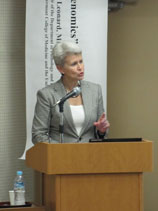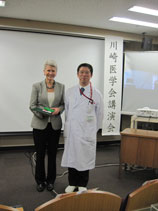Menu
- トップぺージ
- 講演会予定
- 過去の講演会
├令和6年
├令和5年
├令和4年
├令和3年
├令和2年
├平成31年
├平成30年
├平成29年
├平成28年
├平成27年
・第354回
・第353回
・第352回
・第351回
・第350回
・第349回
・第348回
・第347回
・第346回
・第345回
・第344回
・第343回
・第342回
・第341回
・第340回
・第339回
・第338回
・第337回
・第336回
・第335回
・第334回
・第333回
・第332回
・第331回
・第330回
・第329回
・第328回
・第327回
・第326回
・第325回
・第324回
・第323回
・第321回
・第320回
・第319回
・第318回
・第317回
・第316回
├平成26年
├平成25年
├平成24年
├平成23年
├平成22年
├平成21年
└平成20年
- オンデマンド講演会
過去の講演会
第349回川崎医学会講演会
| :: 日 時 | 平成27年10月15日(木) 17:00・18:00 |
| :: 場 所 | 図書館小講堂 |
| :: 座 長 | 森谷 卓也 |
Cancer Genomics
Debra G. B. Leonard, MD, PhD
Professor and Chair of the Department of Pathology and Laboratory Medicine,the University of Vermont College of Medicine and the University of Vermont Medical Center
Cancers are driven by gene mutations in cellular signaling pathways that control cell division, growth, death, and metastasis. As specific mutations and oncogenic pathways are identified, molecularly-targeted therapies are developed, tested through clinical trials, and transitioned into clinical oncology practice. Identification of the gene variations that predict response or failure for these targeted therapies is important for appropriate use of these therapies, to achieve good patient outcomes, and for cost-effective care. The use of next generation sequencing as an approach to cancer gene testing, as well as the clinical significance of specific gene mutations for several major cancers will be discussed.
共催:中国・四国広域がんプロ養成コンソーシアム

